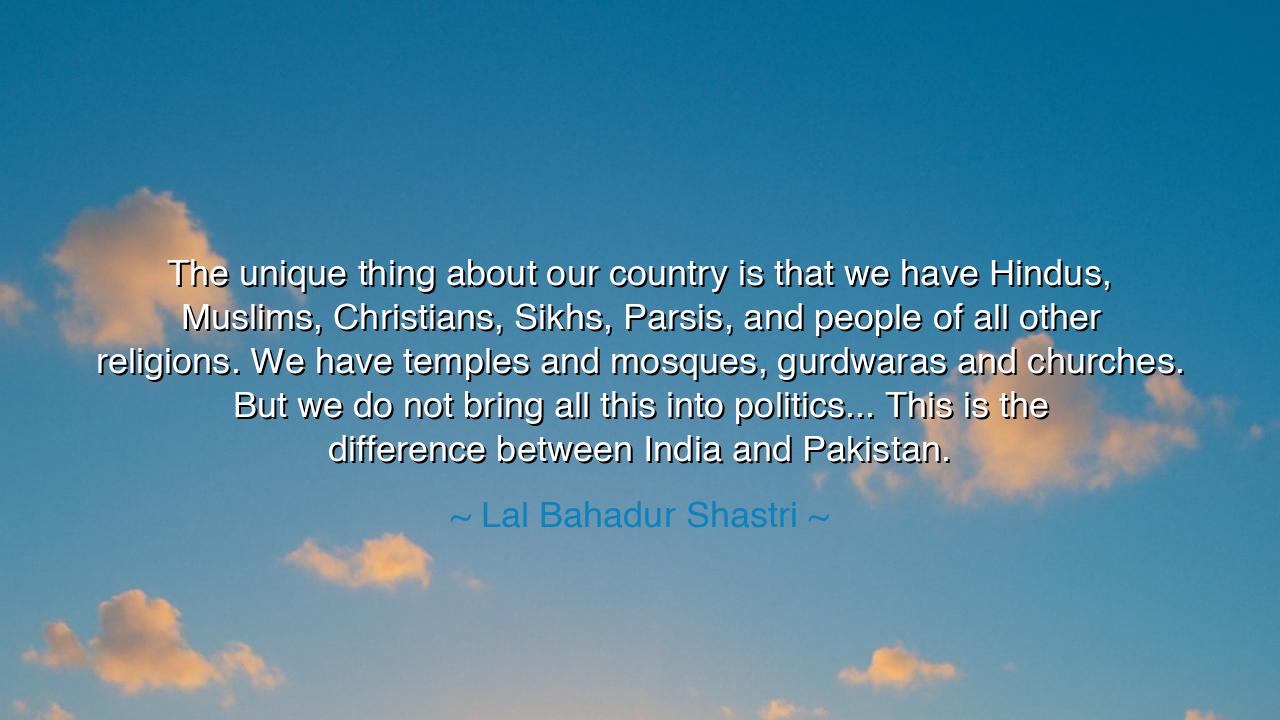
The unique thing about our country is that we have Hindus
The unique thing about our country is that we have Hindus, Muslims, Christians, Sikhs, Parsis, and people of all other religions. We have temples and mosques, gurdwaras and churches. But we do not bring all this into politics... This is the difference between India and Pakistan.






O children of the future, hear the words of Lal Bahadur Shastri, a leader whose vision for India transcended the boundaries of religion and sought to unite the nation under the banner of humanity. "The unique thing about our country is that we have Hindus, Muslims, Christians, Sikhs, Parsis, and people of all other religions. We have temples and mosques, gurdwaras and churches. But we do not bring all this into politics... This is the difference between India and Pakistan." In these words, Shastri calls us to understand that true unity does not come from the division of beliefs, but from the recognition that our shared humanity must transcend the differences in our faiths.
In the ancient world, the greatest philosophers and rulers understood that society must be built upon a foundation of unity, where all people, regardless of their backgrounds or beliefs, could live together in harmony. Ashoka the Great, the Mauryan emperor of India, became a beacon of this ideal. After his conquest of the Kalinga kingdom, he was transformed by the horrors of war and turned to Buddhism, seeking to rule with compassion, peace, and tolerance for all faiths. His rule demonstrated that a nation can flourish when it embraces diversity in thought and faith, just as Shastri advocated for India to do.
Consider also the great leader Nelson Mandela, who, though from a land torn by racial and religious division, sought to unite South Africa under the principle of equality and freedom. He understood that for true peace to be achieved, the division of race and religion must be set aside in politics. Like Shastri, Mandela worked tirelessly to ensure that the political sphere of South Africa was not shaped by religious or cultural strife, but by the collective will of the people. The difference between Mandela's leadership and that of those who sought to divide was his focus on the common good and the shared humanity of all.
Shastri's words also remind us of the profound truth that politics—at its highest and most noble—is not about the imposition of one belief system over another. India stands as a testament to the possibility of coexistence, where the diversity of religions is celebrated, not as a tool for division, but as the very foundation of national unity. The country has flourished because, despite the vast differences in faith and practice, the Indian people have found ways to unite under the common principles of democracy and justice. This is the greatness of India, and it was Shastri's steadfast belief that this unity—beyond religion—was what made it truly unique in the world.
O children, let the words of Lal Bahadur Shastri guide you as you walk your own paths. True strength lies not in the dominance of one religion over others, but in the collective ability to live in peace with all. As the ancients knew, the greatest nations are those where diversity is not feared, but celebrated. The wisdom of Ashoka and Mandela lives on in Shastri's vision for India—a nation where all are equal, where religions coexist, and where politics serves the people, not the divisions between them. Let us carry this lesson forward, knowing that the path to true peace and progress lies in our shared humanity, not in the differences that seek to separate us.






TTony
This quote by Lal Bahadur Shastri highlights the unique and idealistic vision of India. But can it really be said that religion isn’t brought into politics? Given the rise in religious identity politics, especially in some recent elections, is it still true that India avoids bringing religion into politics as Shastri envisioned? How do we ensure that the values of unity and secularism are upheld in a time when politics seems more polarized?
DTDuong Thai
I agree with Shastri’s sentiment that India’s strength lies in its ability to have diverse religious communities while trying to keep religion out of politics. However, in recent years, religion seems to have become a central element in political rhetoric. How can we keep the ideals of unity intact in the face of rising religious nationalism? Is it possible to preserve the spirit of Shastri’s vision in today’s political environment?
DQTran Le Duc Quy
It’s interesting to hear Lal Bahadur Shastri’s perspective on how religion shouldn’t define politics in India, especially when compared to Pakistan. But in today’s world, does religion influence politics in India more than we care to admit? Could Shastri’s statement be seen as aspirational, or do we need a more realistic approach to dealing with the intersection of politics and religion in modern times?
NNNguyen Ngan
Lal Bahadur Shastri’s quote about the religious diversity in India and its separation from politics is thought-provoking. It makes me wonder, though, if we really have achieved this separation today. With growing religious divides in modern politics, can we truly say that religion doesn't play a role in Indian politics anymore? How much of Shastri’s ideal vision of India is still relevant today?